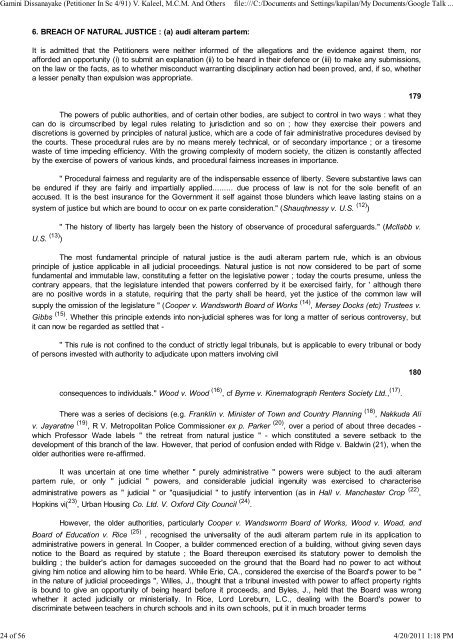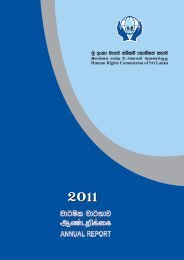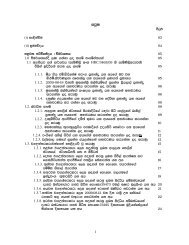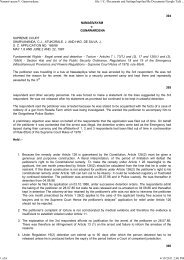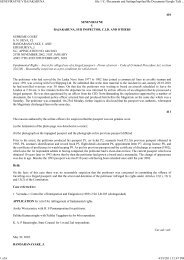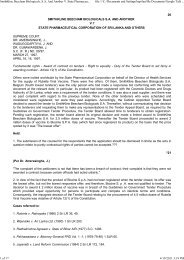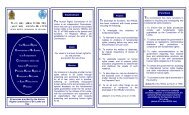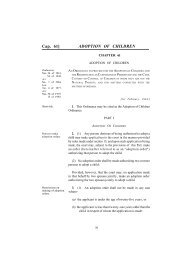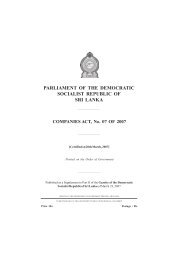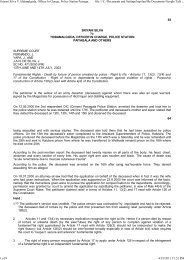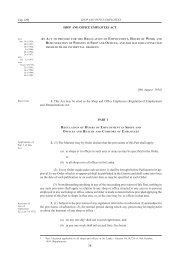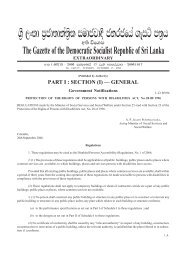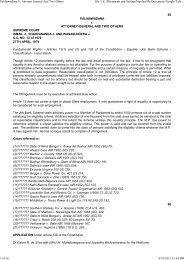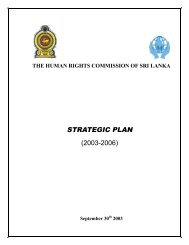Gamini Dissanayake (Petitio... - Human Rights Commission of Sri ...
Gamini Dissanayake (Petitio... - Human Rights Commission of Sri ...
Gamini Dissanayake (Petitio... - Human Rights Commission of Sri ...
You also want an ePaper? Increase the reach of your titles
YUMPU automatically turns print PDFs into web optimized ePapers that Google loves.
<strong>Gamini</strong> <strong>Dissanayake</strong> (<strong>Petitio</strong>ner In Sc 4/91) V. Kaleel, M.C.M. And Others file:///C:/Documents and Settings/kapilan/My Documents/Google Talk ...<br />
6. BREACH OF NATURAL JUSTICE : (a) audi alteram partem:<br />
It is admitted that the <strong>Petitio</strong>ners were neither informed <strong>of</strong> the allegations and the evidence against them, nor<br />
afforded an opportunity (i) to submit an explanation (ii) to be heard in their defence or (iii) to make any submissions,<br />
on the law or the facts, as to whether misconduct warranting disciplinary action had been proved, and, if so, whether<br />
a lesser penalty than expulsion was appropriate.<br />
The powers <strong>of</strong> public authorities, and <strong>of</strong> certain other bodies, are subject to control in two ways : what they<br />
can do is circumscribed by legal rules relating to jurisdiction and so on ; how they exercise their powers and<br />
discretions is governed by principles <strong>of</strong> natural justice, which are a code <strong>of</strong> fair administrative procedures devised by<br />
the courts. These procedural rules are by no means merely technical, or <strong>of</strong> secondary importance ; or a tiresome<br />
waste <strong>of</strong> time impeding efficiency. With the growing complexity <strong>of</strong> modern society, the citizen is constantly affected<br />
by the exercise <strong>of</strong> powers <strong>of</strong> various kinds, and procedural fairness increases in importance.<br />
" Procedural fairness and regularity are <strong>of</strong> the indispensable essence <strong>of</strong> liberty. Severe substantive laws can<br />
be endured if they are fairly and impartially applied......... due process <strong>of</strong> law is not for the sole benefit <strong>of</strong> an<br />
accused. It is the best insurance for the Government it self against those blunders which leave lasting stains on a<br />
system <strong>of</strong> justice but which are bound to occur on ex parte consideration." (Shauqhnessy v. U.S. (12) )<br />
U.S. (13) )<br />
" The history <strong>of</strong> liberty has largely been the history <strong>of</strong> observance <strong>of</strong> procedural saferguards." (Mcllabb v.<br />
The most fundamental principle <strong>of</strong> natural justice is the audi alteram partem rule, which is an obvious<br />
principle <strong>of</strong> justice applicable in all judicial proceedings. Natural justice is not now considered to be part <strong>of</strong> some<br />
fundamental and immutable law, constituting a fetter on the legislative power ; today the courts presume, unless the<br />
contrary appears, that the legislature intended that powers conferred by it be exercised fairly, for ' although there<br />
are no positive words in a statute, requiring that the party shall be heard, yet the justice <strong>of</strong> the common law will<br />
supply the omission <strong>of</strong> the legislature " (Cooper v. Wandsworth Board <strong>of</strong> Works (14) , Mersey Docks (etc) Trustees v.<br />
Gibbs (15) . Whether this principle extends into non-judicial spheres was for long a matter <strong>of</strong> serious controversy, but<br />
it can now be regarded as settled that -<br />
" This rule is not confined to the conduct <strong>of</strong> strictly legal tribunals, but is applicable to every tribunal or body<br />
<strong>of</strong> persons invested with authority to adjudicate upon matters involving civil<br />
consequences to individuals." Wood v. Wood (16) , cf Byrne v. Kinematograph Renters Society Ltd., (17) .<br />
There was a series <strong>of</strong> decisions (e.g. Franklin v. Minister <strong>of</strong> Town and Country Planning (18) , Nakkuda Ali<br />
v. Jayaratne (19) , R V. Metropolitan Police <strong>Commission</strong>er ex p. Parker (20) , over a period <strong>of</strong> about three decades -<br />
which Pr<strong>of</strong>essor Wade labels " the retreat from natural justice " - which constituted a severe setback to the<br />
development <strong>of</strong> this branch <strong>of</strong> the law. However, that period <strong>of</strong> confusion ended with Ridge v. Baldwin (21), when the<br />
older authorities were re-affirmed.<br />
It was uncertain at one time whether " purely administrative " powers were subject to the audi alteram<br />
partem rule, or only " judicial " powers, and considerable judicial ingenuity was exercised to characterise<br />
administrative powers as " judicial " or "quasijudicial " to justify intervention (as in Hall v. Manchester Crop (22) ,<br />
Hopkins vi( 23) , Urban Housing Co. Ltd. V. Oxford City Council (24) .<br />
However, the older authorities, particularly Cooper v. Wandsworm Board <strong>of</strong> Works, Wood v. Woad, and<br />
Board <strong>of</strong> Education v. Rice (25) , recognised the universality <strong>of</strong> the audi alteram partem rule in its application to<br />
administrative powers in general. In Cooper, a builder commenced erection <strong>of</strong> a building, without giving seven days<br />
notice to the Board as required by statute ; the Board thereupon exercised its statutory power to demolish the<br />
building ; the builder's action for damages succeeded on the ground that the Board had no power to act without<br />
giving him notice and allowing him to be heard. While Erie, CA., considered the exercise <strong>of</strong> the Board's power to be "<br />
in the nature <strong>of</strong> judicial proceedings ", Willes, J., thought that a tribunal invested with power to affect property rights<br />
is bound to give an opportunity <strong>of</strong> being heard before it proceeds, and Byles, J., held that the Board was wrong<br />
whether it acted judicially or ministerially. In Rice, Lord Loreburn, L.C., dealing with the Board's power to<br />
discriminate between teachers in church schools and in its own schools, put it in much broader terms<br />
24 <strong>of</strong> 56 4/20/2011 1:18 PM<br />
179<br />
180


